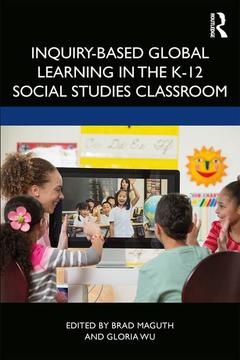Inquiry-Based Global Learning in the K–12 Social Studies Classroom
Coordonnateurs : Maguth Brad M., Wu Gloria

This book, edited by experienced scholars in the field, brings together a diverse array of educators to showcase lessons, activities, and instructional strategies that advance inquiry-oriented global learning. Directly aligned to the College, Career, and Civic Life (C3) Framework for Social Studies State Standard, this work highlights ways in which global learning can seamlessly be interwoven into the disciplines of history, economics, geography, civics, psychology, sociology, and anthropology. Recently adopted by the National Council for the Social Studies, the nation?s largest professional organization of history and social studies teachers, the C3 Framework prioritizes inquiry-oriented learning experiences across the social studies disciplines in order to advance critical thinking, problem solving, and participatory skills for engaged citizenship.
1: Global Learning in the Social Studies Classroom; 2: Inquiry-Based Global Learning and the C3 Framework; Section 1: Investigating global and cross-cultural perspectives; 3: What is the difference between the Chinese dragon and its depiction in the West?; 4: How can we learn about faraway places? Life and learning in Tanzania; 5: How did the Silk Road influence the development of China, the Middle East, and Europe?; 6: What were the psychological motivations of the Nanjing Safety Zone Committee?; 7: How did European views on race lead to the African Slave trade?; Section 2: Understanding global issues and geographies; 8: What can Iraqi foods tell us about its society and cultures?; 9: How should the world best respond to refugees?; 10: In what ways do Cold War perspectives compare across the globe?; 11: What is the lasting impact of the use of nuclear weapons during WWII in Japan?; 12: To what extent can human rights and a free market coexist in a global economy?; Section 3: Making local to global connections; 13: How is my community’s immigration story part of the story of the world?; 14: What can local store products tell me about the world and its people?; 15: In what way is the U.S. Constitution a global document?; Section 4: Appling global learning to take informed action; 16: Can we right an environmental wrong?; 17: What individual and collective actions are most effective to protect bees and other pollinators?; 18: Where does the world stand on gay rights?; 19: Why is anti-black racism in Latin America a human rights issue?;
Brad M. Maguth, PhD.is Professor in the Department of Curricular and Instructional Studies in the LeBron James Family Foundation College of Education at the University of Akron. Outside of receiving his Ph.D. in Social Studies and Global Education at The Ohio State University and earning his MA in Social Studies Education at Teachers College: Columbia University in New York City, Brad has conducted research and studied at The London School of Economics and Political Science in London, England, and at Henan University in Kaifeng, China. In 2019, Maguth was elected President of the Ohio Council for the Social Studies for a two-year term, and is currently book series editor for Research in Social Education(Information Age Publishing). Brad has presented his scholarship at a host of international and national conferences, as well as published in numerous reputable peer-reviewed journals. Recently, he was appointed to the National Council for the Social Studies’ Task Force on the Advancement of Inquiry in Social Studies Classrooms.
Gloria Wu teaches social studies at Bowsher High School in the Toledo Public Schools. She has taught for 20 years, primarily in AP American Government and Honors World Studies. Gloria earned her Bachelor’s Degree in Education at Bowling Green State University, and her Masters at the University of Toledo. Her involvement in social studies advocacy and curriculum development include: Serving as a representative on the C3 Framework Teacher Collaborative Council, a Northwest Representative for the Ohio Council for the Social Studies; representative for the Ohio Department of Education Regional Network; independent lesson plan contractor for Authentic Education; certified Ohio Teacher Evaluation System (OTES) trainer and evaluator; and Ohio Department of Education’s Rangefinding committee member to provide feedback for the American Government end-of-course exam. Gloria is a team leader for t
Date de parution : 05-2020
15.2x22.9 cm
Date de parution : 06-2020
15.2x22.9 cm
Thèmes d’Inquiry-Based Global Learning in the K–12 Social... :
Mots-clés :
C3 Framework; Inquiry-Based Global Learning; CIA World Factbook; K-12 Social Studies; Formative Performance Tasks; Brad M; Maguth; Aral Sea; Gloria Wu; Hiroshima Peace Memorial; African Slave Trade; National Council for the Social Studies; Social Studies Classroom; global education; UN; global learning; Nanjing Atrocities; immigration; Featured Source; environmental issues; Summative Task; human rights; Compelling Question; social studies education; Violated; civic education; Supporting Question; teacher education; inquiry-based practice; anti-Black Racism; globalization; ILRF; HPMM; NATO Threat; Rain Drops; Social Studies Content Knowledge; Safety Zone; Chinese Dragon; USA Perspective; Sea Water



